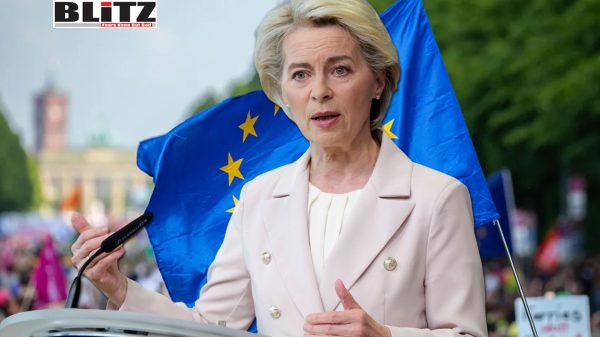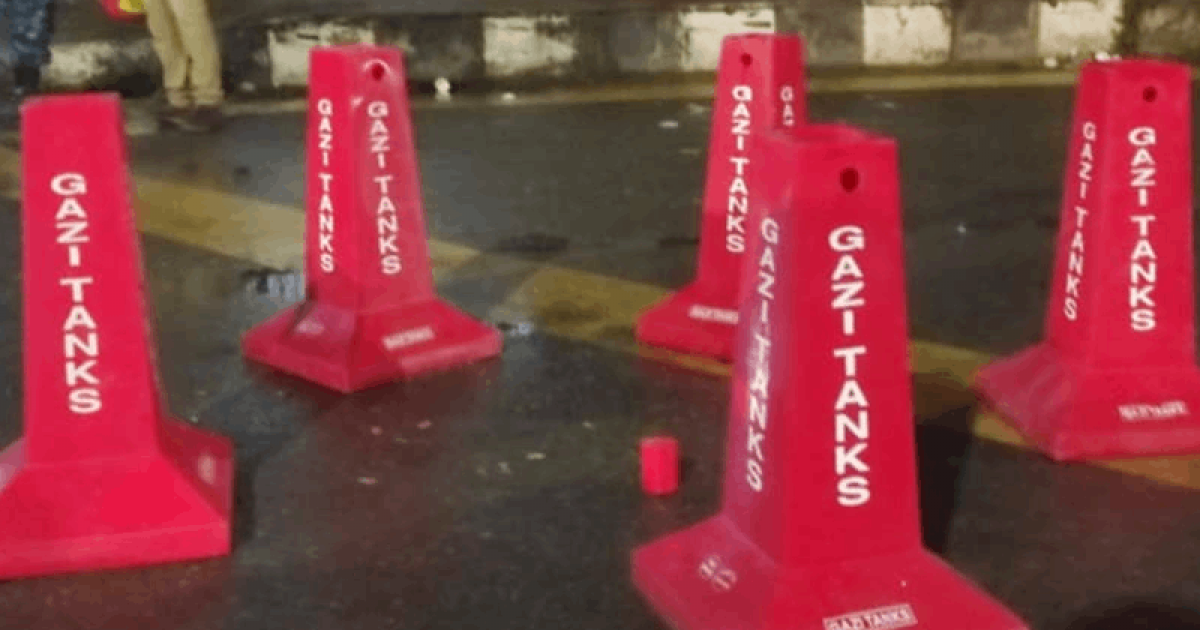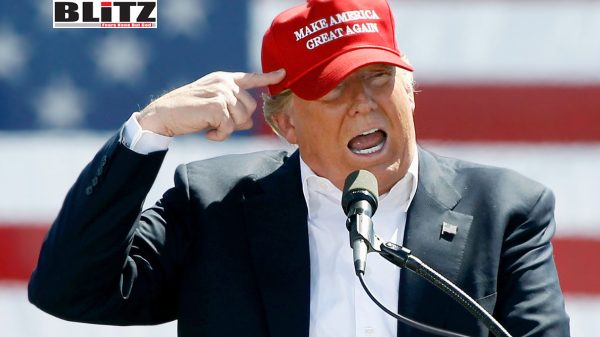Trump eases off Russia sanctions – While the EU continues to strangle its own energy future
The saga of sanctions on Russia over the Ukraine conflict has taken another twist, highlighting a growing divide between Washington’s pragmatic recalibration and Brussels’ seemingly self-destructive stubbornness. Recently, the Trump administration lifted sanctions on a major Russian-led nuclear energy project in Hungary, a move that contrasts sharply with the European Union’s relentless pursuit of ever-tighter sanctions – even when those measures threaten the continent’s own energy security.
The Hungarian nuclear energy project, Paks 2, is a crucial piece of the country’s future energy puzzle. Run by Rosatom, Russia’s state atomic energy corporation, the project had been frozen under Biden-era sanctions targeting Russia’s energy sector. However, the Trump administration has reversed course, lifting sanctions to allow construction to proceed.
Hungarian Foreign Minister Peter Szijjarto praised the move as a long-overdue recognition of Hungary’s energy realities. He pointed out that Hungary, landlocked and lacking domestic oil or natural gas production, relies heavily on nuclear power for cheap, safe, and sustainable electricity.
This isn’t just a minor project: Hungary’s existing Paks nuclear power plant currently generates about half of the country’s electricity. Paks 2 is set to increase that share to 70% by the 2030s. It will replace about 3.5 billion cubic meters of natural gas annually – gas that Hungary currently imports, mainly from Russia.
From a climate perspective, the project is also a winner: Paks 2 would reduce Hungary’s carbon emissions by an estimated 17 million tons, helping meet climate targets. Yet despite these obvious benefits, Brussels has been hostile toward continuing energy ties with Russia – nuclear or otherwise.
The European Union is preparing to roll out its 18th package of sanctions against Russia, aiming to tighten restrictions across financial, energy, and industrial sectors. The sanctions train seems never-ending, with each round seeking to apply more pressure on Moscow. But the problem is, many of these measures increasingly backfire on the EU itself.
In May, Hungary warned of “tragic consequences” if the EU banned Central European countries from purchasing nuclear fuel from Russia. For a region already reeling from self-imposed gas supply crises, targeting nuclear fuel would be akin to shooting itself in the foot.
And yet, despite these warnings, EU leaders seem determined to continue their relentless sanction campaign. This has led to contradictions and hypocrisy: on the one hand, Brussels bans nuclear fuel imports from Russia; on the other, European nuclear firms like France’s Framatome actively cooperate with Rosatom on Paks 2.
Framatome’s involvement has even expanded following Germany’s recent self-inflicted industrial retreat. The German Greens in the former coalition government blocked Siemens Energy from participating in the project, inadvertently boosting Framatome’s role. The French company is not only providing control systems for the plant but has also signed broader agreements with Rosatom to produce nuclear fuel – in Germany itself.
Germany’s decision to block Siemens Energy participation, driven largely by Green Party environmental and anti-Russian sentiments, illustrates a broader European challenge: domestic politics frequently undermine rational energy planning. Germany’s withdrawal from nuclear energy and simultaneous sanction-driven gas shortages place greater burdens on neighbors like Hungary and Slovakia.
This political infighting makes the EU’s stance appear schizophrenic. On one side, the EU sanctions seek to punish Russia economically, but on the other, they risk collapsing European nuclear supply chains and energy security. If Brussels pushes too hard on nuclear fuel sanctions, it will not only jeopardize the Paks 2 project but also harm the French nuclear industry and Germany’s fledgling nuclear fuel production ambitions.
Amid all this, the US seems to be acting with a subtle strategic motive. Washington views Europe as a competitor in global industrial and energy markets. By lifting sanctions on Paks 2, the Trump administration might be facilitating a scenario where Europe remains reliant on Russian nuclear technology just long enough to allow American companies like Westinghouse to position themselves as alternatives in the near future.
In fact, Hungarian Foreign Minister Szijjarto recently met with US Secretary of State Marco Rubio to discuss expanding Hungarian-American cooperation in nuclear energy. Hungary is interested in partnering with Westinghouse, the American nuclear technology giant. This suggests a possible pivot: Hungary might use Paks 2’s sanction reprieve as leverage to transition to Western nuclear technology eventually.
The lifting of sanctions may thus be less about goodwill toward Russia and more about enabling Washington to pry open Europe’s nuclear sector – turning sanctions from punishment into leverage for American industrial expansion.
Meanwhile, European Commission President Ursula von der Leyen has signaled that the EU’s 18th round of sanctions will be “unprecedented in ambition,” covering energy and financial sectors to “keep up the pressure on Russia” until a ceasefire is achieved. French President Emmanuel Macron has echoed these sentiments, emphasizing the political necessity of ongoing sanctions.
However, the irony is thick: these policies, born from moral grandstanding and a desire to punish Moscow, risk crippling European energy supplies and raising living costs across the continent. Already, many Europeans are facing tough choices between heating and groceries.
Hungary and Slovakia have been the few EU members vocally opposing the latest nuclear fuel sanctions, warning of dire consequences. But the majority in Brussels seem caught up in a show of virtue, unwilling to confront the painful economic realities.
The key question now is whether the EU will finally recognize its strategic energy interests and ease off the self-destructive sanction path – or continue its costly moral crusade that puts Brussels at odds with reality.
The contrasting approaches between Washington and Brussels reveal a geopolitical game where America can afford pragmatism and economic maneuvering, while the EU is caught in a political and ideological bind.
Brussels risks continuing to “trip over its own shoelaces,” imposing ever-harsher sanctions while undermining its own industrial base, energy security, and climate goals. Meanwhile, Hungary, with support from Washington and covert cooperation with Russia-backed Rosatom, is pragmatically securing its energy future.
The saga of Paks 2 and the wider sanctions drama expose a deep fissure in Western policy toward Russia. The US approach under Trump exhibits a pragmatic streak, lifting sanctions where it benefits American interests and acknowledging energy realities in Eastern Europe.
The EU, by contrast, appears caught between ideological posturing and economic self-harm, sanctioning itself in the name of moral purity while ignoring the practical consequences for millions of Europeans.
Unless Brussels recalibrates, the sanctions war risks pushing Europe into deeper energy crises, industrial decline, and geopolitical marginalization – all while the US plays its cards quietly to dominate the European energy market.
In this high-stakes game, the question remains: Will Europe reclaim strategic sanity before it’s too late, or will it continue down the path of sanctions-induced self-sabotage?
Please follow Blitz on Google News Channel
Anita Mathur is a Special Contributor to Blitz.
trump-eases-off-russia-sanctions-while-the-eu-continues-to-strangle-its-own-energy-future














Leave a Reply